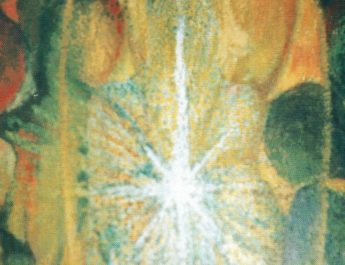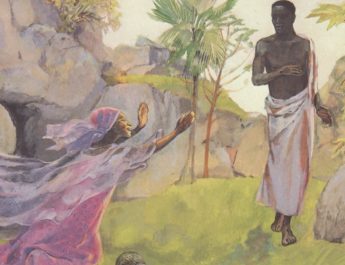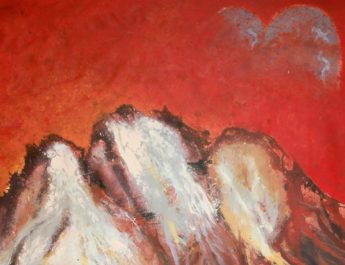1 Kings 8:1, 6, 10-11, 22-30, 41-43
Ordinary B39
BibleHub
1 Then SolomonI assembledII the eldersIII of IsraelIV and all the headsV of the tribes,VI
Notes on verse 1a
I “Solomon” = Shelomoh. From shalam (to be complete or sound; to have safety mentally, physically, or extending to one’s estate; so, if these things are safe and complete, the implication is that one would be friendly; and, if being friendly, one would make amends and that friendship would be reciprocated). This is Solomon or Shelomoh, meaning “peaceful.” It is the same word as the Hebrew word for peace – shalom.
II “assembled” = qahal. From qahal (assembly, congregation, multitude). This is to gather, convene, assemble like a congregation.
III “elders” = zaqen. From the same as zaqan (beard or chin – the beard represents old age). This is old, aged, or elder.
IV “Israel” = Yisrael. From sarah (to persist, exert oneself, contend, persevere, wrestle, prevail) + el (God or god). This is Israel, meaning God strives or one who strives with God; new name for Jacob and for his offspring. This refers to the people and to the land.
V “heads” = rosh. This may come a word that means to shake. It is the head, captain, or chief. It can also be excellent or the forefront. It can be first in position or in statue or in time (i.e. the beginning).
VI “tribes” = matteh. From natah (to stretch or spread out, extend, bend). This is a staff, rod, branch, or tribe. It could be a rod for discipline or correction. It could be a scepter to indicate authority, a throwing lance, or a walking staff. Figuratively, it could also be something that supports life (like bread).
the leadersVII of the ancestral housesVIII of the Israelites,IX before KingX Solomon in Jerusalem,XI
Notes on verse 1b
VII “leaders” = nasi. From nasa (to lift in a broad sense, literally and figuratively; to carry, take, or arise; to bring forth, advance, accept). This is one lifted up or exalter. So, it could be prince, chief, ruler, captain, king, or vapor.
VIII “ancestral houses” = ab. This is father, chief, or ancestor. It is father in a literal or figurative sense.
IX “Israelites” = ben + Yisrael. Literally “children of Israel.” Ben is from banah (to build or obtain children). This is son, age, child. It is son in a literal or figurative sense. Yisrael is the same as “Israel” in v1. See note IV above.
X “King” = melek. From malak (to be or become king or queen, to rise to the throne, to be crowned; by implication, to take counsel). This is king or royal.
XI “Jerusalem” = Yerushalaim. Related to “Solomon” in v1. From yarah (to throw, shoot, be stunned; to flow as water so figuratively to instruct or teach) + shalam (see note I above). This is Jerusalem, dwelling of peace.
to bring upXII the arkXIII of the covenantXIV of the LordXV
Notes on verse 1c
XII “bring up” = alah. This is to go up, approach, ascend, be high, be a priority; to arise in a literal or figurative sense.
XIII “ark” = aron. Perhaps from arah (to gather or pluck). This is a chest, box, or coffin. It is used for the Ark of the Covenant.
XIV “covenant” = berit. Perhaps from barah (to eat, choose, make clear); perhaps from bar (grain, wheat); from bara (to select, purify, cleanse, test, brighten, polish). This is a compact, covenant, alliance, treaty, or league.
XV “Lord” = YHVH. From havah (to be, become) or hayah (to come to pass, become, be). This is the name of the God of Israel, the self-existent and eternal one, the tetragrammaton. This pronunciation has been lost to time so “Lord” is generally used in its place.
out of the cityXVI of David,XVII which is Zion.XVIII
Notes on verse 1d
XVI “city” = iyr. From uwr (to awaken or wake oneself up). This can mean excitement in the sense of wakefulness or city. Properly, this is a place that is guarded. Guards kept schedules according to watches. This sense of the word would include cities as well as encampments or posts that were guarded.
XVII “David” = David. From the same as dod (beloved, love, uncle); the root may mean to boil, which is used figuratively to describe love. So, this implies someone you love such as a friend, a lover, or a close family member like an uncle. David’s name likely means something like “beloved one.”
XVIII “Zion” = Tsiyyon. Related to tsyiyyun (signpost, monument); from tsavah (to charge someone, to command, order); from the same as tsiyyah (dryness drought); from a root meaning parched as desert, dry land. Zion can refer to a mountain in Jerusalem as well as another name for Jerusalem itself or the people.
6 Then the priestsXIX broughtXX the ark of the covenant of the Lord to its place,XXI in the inner sanctuaryXXII of the house,XXIII
Notes on verse 6a
XIX “priests” = kohen. This is literally the one who officiates i.e. the priest. This is where the Jewish last name “Cohen” (and its variants) comes from.
XX “brought” = bo. This is to enter, come in, advance, fulfill, bring offerings, enter to worship, attack. It can also have a sexual connotation.
XXI “place” = maqom. From qum(to arise, stand, accomplish, establish, abide; rising against, getting up after being sick or asleep, arising from one state to another, becoming powerful, or rising for action; standing in a figurative sense). This is a standing, which is to say a spot or space a place. It can also refer to a locality or a physical/mental condition. HaMaqom is also a Jewish name for God – the place, i.e. the Omnipresent One.
XXII “inner sanctuary” = debir. 16x in OT. Perhaps from dabar (to speak, declare, discuss). May mean a place of speaking like an oracle. It is the inner sanctuary of Solomon’s Temple.
XXIII “house” = bayit. Related to “Israelites” in v1. Probably from banah (see note IX above). This is house, court, family, palace, temple.
in the most holy place,XXIV underneath the wingsXXV of the cherubim.XXVI
Notes on verse 6b
XXIV “most holy place” = qodesh + qodesh. Literally “holy of holies.” This is set apart and so sacred. God is different from us and so God is holy/set apart. Things we dedicate to God’s service are set apart for God and so they, too, are holy, etc.
XXV “wings” = kanaph. This is wing, edge, corner, extremity. It can also be a flap or fold of a garment or the pinnacle of a building.
XXVI “cherubim” = kerub. Perhaps related to Akkadian (“to bless” or “one who blesses”). This is a cherub – perhaps a class of angels. See https://en.wiktionary.org/wiki/%D7%9B%D7%A8%D7%95%D7%91#Hebrew
10 AndXXVII when the priests came outXXVIII of the holy place, a cloudXXIX filledXXX the house of the Lord,
Notes on verse 10
XXVII {untranslated} = hayah. Related to “Lord” in v1. See note XV above.
XXVIII “came out” = yatsa. This is to go or come out, bring forth, appear. It is to go out in a literal or figurative sense.
XXIX “cloud” = anan. May be from anan (cover, cloud over; figuratively, acting in a secret way, practicing magic or soothsaying). This is a cloud as something that covers the sky.
XXX “filled” = male. This is fill, satisfy, replenish, accomplish, fulfill, confirm, or consecrate. It is fill in a literal or figurative sense.
11 so that the priests couldXXXI not standXXXII to ministerXXXIII becauseXXXIV of the cloud; for the gloryXXXV of the Lord filled the house of the Lord.
Notes on verse 11
XXXI “could” = yakol. This is to be able, endure, overcome, prevail.
XXXII “stand” = amad. This is to stand up in a literal or figurative sense. So it can be establish, continue, endure, take a stand, act, be a servant, stand still, remain, stand against an enemy.
XXXIII “minister” = sharat. This is ministering, serving, or waiting on. It can refer to one offering service as a worshipper or one serving as a servant.
XXXIV “because” = paneh. From panah (to turn, face, appear). This is face in a literal or figurative sense. It could be face, presence, anger, respect. It can also be used of God to indicate divine favor or presence.
XXXV “glory” = kabod. From kabad (to be heavy, weighty, burdensome). This is weighty. Figuratively, glorious, abundant, riches, honor, splendor – a reference to one’s reputation or character. This word is often used to describe God and God’s presence.
22 Then Solomon stood beforeXXXVI the altarXXXVII of the Lord in the presenceXXXVIII of all the assemblyXXXIX of Israel,
Notes on verse 22a
XXXVI “before” = paneh. Same as “because” in v11. See note XXXIV above.
XXXVII “altar” = mizbeach. From zabach (to kill, slay, offer; slaughtering an animal to offer as a sacrifice). This is an altar.
XXXVIII “presence” = neged. From nagad (to declare, make conspicuous, stand in front, manifest, predict, explain). This is in front of, opposite to. It can refer to a counterpart or partner, one corresponding to or in the sight of.
XXXIX “assembly” = qahal. Related to “assembled” in v1. See note II above.
and spread outXL his handsXLI to heaven.XLII
Notes on verse 22b
XL “spread out” = paras. This is to spread or stretch out, extend, break up, chop to pieces, disperse, display.
XLI “hands” = kaph. From kaphaph (to bend – from a root meaning curve or bend down). This is palm of the hand or sole of the foot, footstep, grasp. Figuratively, it can also mean power.
XLII “heaven” = shamayim. Root may mean being lofty. This is sky, the air, or heaven. It is in a dual noun form so this might refer to the part of the sky where the clouds move on the one hand and the part beyond that where the sun, moon, and stars are on the other hand.
23 He said, “O Lord, GodXLIII of Israel, there is no God like you in heaven above or on earthXLIV beneath, keepingXLV covenant and steadfast loveXLVI
Notes on verse 23a
XLIII “God” = Elohim. Related to “Israel” in v1. See note IV above.
XLIV “earth” = erets. Root may mean to be firm. This is earth, ground, field land, or country.
XLV “keeping” = shamar. This is to keep, watch, or preserve. It means to guard something or to protect it as a thorny hedge protects something.
XLVI “steadfast love” = chesed. From chasad (being good, kind, merciful; may mean bowing one’s neck as is done in the presence of an equal for courtesy’s sake; so, if one in a superior position is treating you like an equal, that is what is captured here). This is favor, goodness, kindness, loving kindness, pity, reproach, or a good deed. When done by God to humanity, this is mercy/loving kindness. When done by humanity to God, it is piety.
for your servantsXLVII who walkXLVIII beforeXLIX you with all their heart,L
Notes on verse 23b
XLVII “servants” = ebed. From abad (to work, serve, compel; any kind of work; used causatively, can mean to enslave or keep in bondage). This is a servant, slave, or bondservant.
XLVIII “walk” = halak. This is go, come, walk. It is walk literally and figuratively and includes people and animals. It can be used figuratively for one’s moral life – how we walk according to God’s way or against it. It can also refer to the walk of life as in the course one’s life takes, the choices we make, etc.
XLIX “before” = paneh. Same as “because” in v11. See note XXXIV above.
L “heart” = leb. May be related to labab (to encourage; properly, to be encased as with fat; used in a good sense, this means to transport someone with love; used in a bad sense, it can mean to dull one’s senses). This is the heart, courage, one’s inner self, the mind, or the will. Heart is only used in a figurative sense in the Old and New Testaments.
24 the covenant that you kept for your servant my fatherLI David as you declaredLII to him; you promisedLIII with your mouthLIV
Notes on verse 24a
LI “father” = ab. Same as “ancestral houses” in v1. See note VIII above.
LII “declared” = dabar. Related to “inner sanctuary” in v6. See note XXII above.
LIII “promised” = dabar. Same as “declared” in v24. See note LII above.
LIV “mouth” = peh. This is mouth in a literal or figurative sense. So, more literally, it can be beak or jaws. More figuratively, it refers to speech, commands, or promises.
and have this dayLV fulfilledLVI with your hand.LVII
Notes on verse 24b
LV “day” = yom. Root may mean being hot. This is the day in a literal or figurative sense. It can also mean birth, age, daylight, continually or other references to time.
LVI “fulfilled” = male. Same as “filled” in v10. See note XXX above.
LVII “hand” = yad. This is hand, ability, power. Hand in a literal sense, but also what one can do or the means by which one does it.
25 Therefore, O Lord, God of Israel, keep for your servant my father David that which you promised him, saying, ‘There shall never failLVIII you a successorLIX beforeLX me to sitLXI on the throneLXII of Israel,
Notes on verse 25a
LVIII “fail” = karat. This is to cut down, cut off, or make a covenant (idiom for making a covenant is “to cut a covenant”). It can also mean to destroy, fail, or consume.
LIX “successor” = ish. Perhaps from enosh (human, humankind, mortal); from anash (to be weak, sick, or frail). This is man, husband, another, or humankind.
LX “before” = paneh. Same as “because” in v11. See note XXXIV above.
LXI “sit” = yashab. This is to sit and so to remain and so to dwell. It is sitting for any reason – as a judge, in order to ambush, or just sitting quietly. Causatively, this can mean settling or marrying. This can also mean continue, endure, or establish.
LXII “throne” = kisse. From the same as kese (full moon); perhaps from kasah (to cover, conceal, overwhelm; to cover as clothes do or to hide a secret). This is throne – a seat that is covered or has a canopy. Thus, it is a seat that conveys authority.
if onlyLXIII your childrenLXIV look toLXV their way,LXVI to walk beforeLXVII me as you have walked beforeLXVIII me.’
Notes on verse 25b
LXIII “only” = raq. From the same as raq (thin, surely, only); perhaps from raqaq (to spit). This is but, except, at least. In the sense of being thin, it figuratively refers to some kind of limit.
LXIV “children” = ben. Same as “Israelites” in v1. See note IX above.
LXV “look to” = shamar. Same as “keeping” in v23. See note XLV above.
LXVI “way” = derek. From darak (to tread, march, to walk. Can also mean affixing a string to a box since one needs to step on it to bend it in the process; so also an archer). This is a road as a thing that is walked on. Can be used figuratively for the path that one’s life takes or how one chooses to live one’s life.
LXVII “before” = paneh. Same as “because” in v11. See note XXXIV above.
LXVIII “before” = paneh. Same as “because” in v11. See note XXXIV above.
26 Therefore, O God of Israel, let your wordLXIX be confirmed,LXX, LXXI which you promised to your servant my father David.
Notes on verse 26
LXIX “word” = dabar. Related to “inner sanctuary” in v6 & “declared” in v24. From dabar (see note XXII above). This is speech, a word, a matter, an affair, charge, command, message, promise, purpose, report, request. It is a word, which implies things that are spoken of in a wide sense.
LXX “be confirmed” = aman. This is to believe, endure, fulfill, confirm, support, be faithful. It is to put one’s trust in, be steadfast. Figuratively, this is to be firm, steadfast, or faithful, trusting, believing, being permanent, morally solid. This is where the word “amen” comes from.
LXXI {untranslated} = na. This particle is used for requests or for urging. It can be we pray, now, I ask you, oh. This is the same “na” in “hosanna.”
27 “But will God indeedLXXII dwellLXXIII on the earth?LXXIV Even heaven and the highest heavenLXXV cannot containLXXVI you, much less this house that I have built!LXXVII
Notes on verse 27
LXXII “indeed” = umnam. Related to “be confirmed” in v26. 5x in OT. From aman (see note LXX above) OR from omnam (indeed, truly, no doubt); {from aman (see above)} OR from omen (faithfulness, truth); {from aman (see above)}. This is truly, really, or indeed. It shares a root with the word “amen.”
LXXIII “dwell” = yashab. Same as “sit” in v25. See note LXI above.
LXXIV {untranslated} = hinneh. From hen (lo! Behold! If, though; an expression of surprise). This is to draw attention, show suddenness or surprise, or to emphasize the importance of the coming statement. See! Lo! Behold!
LXXV “highest heaven” = shamayim + shamayim. Literally “the heavens of heavens.” Same as “heaven” in v22. See note XLII above.
LXXVI “contain” = kul. This is to hold in. So, it can be to contain, measure, guide, or feed. It can also mean to be able to or sustain.
LXXVII “built” = banah. Related to “Israelites” in v1 & “house” in v6. See note IX above.
28 RegardLXXVIII your servant’s prayerLXXIX and his plea,LXXX O Lord my God,
Notes on verse 28a
LXXVIII “regard” = panah. Related to “because” in v11. See note XXXIV above.
LXXIX “prayer” = tephillah. From palal (to judge for oneself or in an official capacity; to pray or make supplication, to entreat). This is prayer or intercession. It can also be a hymn.
LXXX “plea” = techinnah. From chanan (beseech, show favor, be gracious; properly, to bend in kindness to someone with less status). This is grace, favor, entreaty, mercy.
heedingLXXXI the cryLXXXII and the prayer that your servant praysLXXXIII toLXXXIV you today;
Notes on verse 28b
LXXXI “heeding” = shama. This is to hear, call, consent, or consider. It implies listening intelligently, giving attention, and, because of these two factors, obedience and action are often implied.
LXXXII “cry” = rinnah. From ranan (a cry of joy or a joyful song; properly, emitting a shrill sound, especially one of joy). This is a song, shout, cry of joy, or proclamation. It could also be a shout of grief.
LXXXIII “prays” = palal. Related to “prayer” in v28. See note LXXIX above.
LXXXIV “to” = paneh. Same as “because” in v11. See note XXXIV above.
29 that your eyesLXXXV may beLXXXVI openLXXXVII nightLXXXVIII and day toward this house, the place of which you said, ‘My name shall be there,’LXXXIX that you may heed the prayer that your servant prays toward this place.
Notes on verse 29
LXXXV “eyes” = ayin. This is eye in a literal or figurative sense so eye, appearance, favor, or a fountain (the eye of the landscape).
LXXXVI “be” = hayah. Same as {untranslated} in v10. See note XXVII above.
LXXXVII “open” = patach. This is to open wide in a literal or figurative sense. So, it is open, draw out, let something go free, break forth. It can also mean to plow, engrave, or carve.
LXXXVIII “night” = layil. Properly, this refers to light twisting away. It is used for night or midnight. Figuratively, this can mean adversity.
LXXXIX “my name shall be there” = hayah + shem + sham. In Hebrew “shemi sham.” Hayah is the same as {untranslated} in v10. See note XXVII above. Shem may be from sum (to put, place, set). This is name, fame, renown. A name was thought to indicate something essential about a person – something about their individuality. So, this word can also mean honor, authority, or character. Sham is there.
30 HearXC the plea of your servant and of your peopleXCI Israel when they pray toward this place; O hear in heaven your dwelling place; heed and forgive.XCII
Notes on verse 30
XC “hear” = shama. Same as “heeding” in v28. See note LXXXI above.
XCI “people” = am. From amam (to darken, hide, associate; creating shadows by huddling together). This is people or nation. It can be used specifically for a tribe, collectively of troops or armies, or figuratively to refer to a flock of animals.
XCII “forgive” = salach. This is to forgive or spare.
41 “Likewise when a foreigner,XCIII who is not of your people Israel, comesXCIV from a distantXCV landXCVI because of your name
Notes on verse 41
XCIII “foreigner” = nokri. From neker (strange; to act foreign or strange; to disguise; can also be misfortune or unexpected calamity); from nakar (to recognize, examine, take notice, show, scrutinize). This is foreign, alien, stranger, extraordinary, adulteress. It is strange in many different senses – foreign, not being one’s relative, different, wonderful, relating to adultery.
XCIV “comes” = bo. Same as “brought” in v6. See note XX above.
XCV “distant” = rachoq. From rachaq (to widen, become distant, cast, or remove in a literal or figurative sense). This is distant or far, whether of space or of time.
XCVI “land” = erets. Same as “earth” in v23. See note XLIV above.
42 —for they shall hear of your greatXCVII name, your mightyXCVIII hand,XCIX and your outstretchedC armCI—when a foreigner comes and prays toward this house,
Notes on verse 42
XCVII “great” = gadol. From gadal (to grow up, become great, become wealthy – to advance. The root meaning may be to twist in the sense of the process of growing). This is great, high, bigger, noble, old, marvelous. It can also refer to someone who is powerful or distinguished.
XCVIII “mighty” = chazaq. This is to strengthen, seize, be courageous, repair, bind, heal, conquer, harden.
XCIX “hand” = yad. Same as “hand” in v24. See note LVII above.
C “outstretched” = natah. Related to “tribes” in v1. See note VI above.
CI “arm” = zeroa. Perhaps from zara (to sow, scatter seed, conceive). This is the arm, shoulder, or foreleg of an animal. It is figuratively used for power, force, might, or help.
43 then hear in heaven your dwelling place,CII and doCIII according to all that the foreigner callsCIV to you, so that all the peoples of the earth may knowCV your name and fearCVI you, as do your people Israel, and so that they may know that your name has been invokedCVII on this house that I have built.
Notes on verse 43
CII “place” = makon. 17x in OT. From kun (properly, in a perpendicular position; literally, to establish, fix, fasten, prepare; figuratively, it is certainty, to be firm, faithfulness, render sure or prosperous). This is a foundation, fixture, basis. It can also be a place or abode as somewhere that is established.
CIII “do” = asah. This is to make, do, act, appoint, become in many senses.
CIV “calls” = qara. This is to call or call out – to call someone by name. Also used more broadly for calling forth.
CV “know” = yada. This is to know, acknowledge, advise, answer, be aware, be acquainted with. Properly, this is to figure something out by seeing. It includes ideas of observation, recognition, and care about something. It can be used causatively for instruction, designation, and punishment.
CVI “fear” = yare. This is to fear, be afraid, dreadful. It can also refer to fearful reverence – to fear in a moral sense is to say to revere, respect.
CVII “invoked” = qara. Same as “calls” in v43. See note CIV above.
Image credit: “Mountains and Light” by Ky0n Cheng, 2013.




